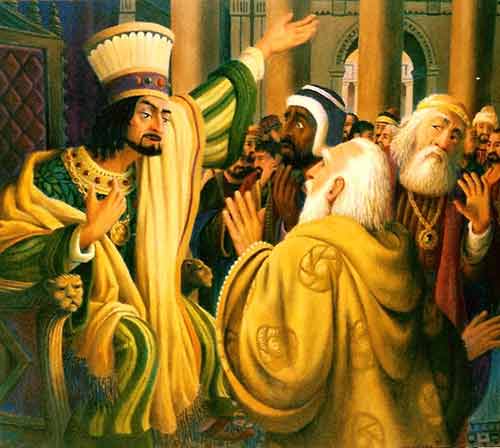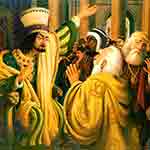
When King Herod heard this, he was frightened, and all Jerusalem with him; and calling together all the chief priests and scribes of the people, he inquired of them where the Messiah was to be born. They told him, ‘In Bethlehem of Judea; for so it has been written by the prophet:
“And you, Bethlehem, in the land of Judah,
are by no means least among the rulers of Judah;
for from you shall come a ruler
who is to shepherd my people Israel.” ’ (Matthew 2:3-6)Ἀκούσας δὲ Ἡρώδης ὁ βασιλεὺς ἐταράχθη, καὶ πᾶσα Ἱεροσόλυμα μετ᾽ αὐτοῦ καὶ συναγαγὼν πάντας τοὺς ἀρχιερεῖς καὶ γραμματεῖς τοῦ λαοῦ, ἐπυνθάνετο παρ᾽ αὐτῶν ποῦ ὁ Χριστὸς γεννᾶται οἱ δὲ εἶπον αὐτῷ, Ἐν Βηθλεὲμ τῆς Ἰουδαίας οὕτως γὰρ γέγραπται διὰ τοῦ προφήτου, Καὶ σὺ Βηθλεὲμ γῆ Ἰούδα, οὐδαμῶς ἐλαχίστη εἶ ἐν τοῖς ἡγεμόσιν Ἰούδα ἐκ σοῦ γὰρ ἐξελεύσεται ἡγούμενος, ὅστις ποιμανεῖ τὸν λαόν μου τὸν Ἰσραήλ
Once again, our slow reading of Matthew uncovers an embarrassment for the selectively biblical literalists. Matthew not only misquotes his Old Testament source, but, as we will discuss below, he disagrees with it. We can learn from Matthew’s approach to the scriptures.
Herod was understandably frightened. “King of the Jews” was his official title. Here, there was talk of a rival for the title.
All Jerusalem – this personification, of course, is a generalisation. It does not include everyone.
Chief priests – appears to include members of the high priestly family beyond the high priest.
Scribes – the scholars who interpret the Bible, and, in this overture, indicate those who will oppose the adult Jesus later in this story.
The Messiah is simply identified with The King of the Jews interchangeably without further explanation. None, it seems, was needed.
In Bethlehem of Judea – appears to have been the accepted origin of the messiah. Cf. John 7:42 Has not the scripture said that the Messiah is descended from David and comes from Bethlehem, the village where David lived?’
The prophet – there is no such exact prophecy in the Hebrew/Septuagint Bible. The closest to Matthew’s text is Micah 5:2(1):
But you, O Bethlehem of Ephrathah,
who are one of the little clans of Judah,
from you shall come forth for me
one who is to rule in Israel,
whose origin is from of old,
from ancient days.
καὶ σύ Βηθλεεμ οἶκος τοῦ Εφραθα ὀλιγοστὸς εἶ τοῦ εἶναι ἐν χιλιάσιν Ιουδα ἐκ σοῦ μοι ἐξελεύσεται τοῦ εἶναι εἰς ἄρχοντα ἐν τῷ Ισραηλ καὶ αἱ ἔξοδοι αὐτοῦ ἀπ’ ἀρχῆς ἐξ ἡμερῶν αἰῶνος
Matthew appears to combine his adaptation of the text from Micah with Matthew’s adaptation of2 Sam 5:2. Once again, our slow reading of Matthew uncovers an embarrassment for the selectively biblical literalists. “Land of Judah” replaces “Ephrathah”. Amongst other alterations, Matthew indicates he does not agree with Micah’s assessment of the insignificance of Bethlehem and so writes, “you, Bethlehem, in the land of Judah, are by no means least”.
I think we can learn from Matthew’s approach to the scriptures.
This is the seventeenth post in a series – you can begin here:
Matthew in Slow Motion 1
Matthew in Slow Motion 2
Matthew in Slow Motion 3
Matthew in Slow Motion 4
Matthew in Slow Motion 5
Matthew in Slow Motion 6
Matthew in Slow Motion 7
Matthew in Slow Motion 8
Matthew in Slow Motion 9
Matthew in Slow Motion 10
Matthew in Slow Motion 11
Matthew in Slow Motion 12
Matthew in Slow Motion 13
Matthew in Slow Motion 14
Matthew in Slow Motion 15
Matthew in Slow Motion 16
As this year the Sunday Gospel readings’ focus is on St Matthew’s Gospel, I thought I’d start some of my personal study and Lectio Divina with that Gospel. [NB. I am using ‘Matthew’ as a convenient term for the author of the first Gospel in the order of the Christian canon].
If you appreciated this post, do remember to like the liturgy facebook page, use the RSS feed, and sign up for a not-very-often email, …



